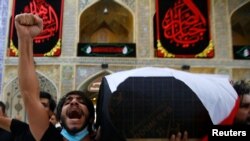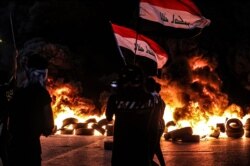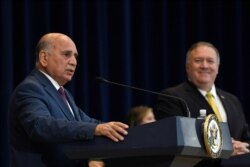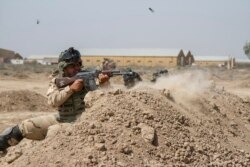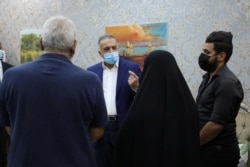On August 19, the day when Mustafa al-Kadhimi arrived in Washington for his first White House meeting as the Iraqi prime minister, his country lost a prominent female human rights activist who advocated for basic services such as drinking water in the oil-rich city of Basra.
Reham Yacoub, 29, had just left the gym when unknown gunmen on a motorcycle fatally shot her in her car, according to Human Rights Watch (HRW).
In a report Wednesday, HRW warned that Iraq has turned into a country where militia groups openly defy the law with minimal response from authorities.
"Unfortunately, the reality is that right now, people are getting killed in Iraq by groups who clearly from their behavior know that they are immune from the law," Belkis Wille, author of the HRW report, told VOA. "That is what is most disturbing about these killings in Basra and people being able to conduct assassinations in broad daylight."
According to HRW, unidentified gunmen have killed at least two protesters and wounded four others since August 14 in the Iraqi southern province and city of the same name. The victims were reportedly members of Al-Basra Civil Youth, a group founded in 2014 by young people to organize protests in the city.
HRW urged Kadhimi, who has vowed not to let the blood of peaceful activists and writers be shed in vain, to release the results of his government's investigations into the killing of internationally recognized scholar Husham al-Hashimi, who was gunned down outside his home in Baghdad less than two months ago.
Kadhimi's office did not respond to VOA's request for comment about the HRW report.
Pro-Iran militias
Kadhimi, a former journalist who was Iraq's former chief of intelligence, received a warm welcome in Washington last week.
While U.S. President Donald Trump said American troop levels will be reduced in Iraq, he also reiterated U.S. support for Kadhimi to overcome his country's domestic challenges.
U.S. Secretary of State Mike Pompeo was more specific about what U.S. officials hoped Kadhimi would prioritize in Iraq.
"Armed groups not under the full control of the prime minister have impeded our progress," said Pompeo, talking alongside his Iraqi counterpart, Fuad Hussein, during a press conference at the State Department on August 19.
"Those groups need to be replaced by local police as soon as possible. I assured Dr. Fuad that we could help and that we would help," Pompeo said.
Iraqi activists and protest leaders in the past have accused Iran-backed Shiite militias such as Kataeb Hezbollah of being the primary culprits behind the assassinations.
Some experts say the current level of U.S. support is not enough to enable Kadhimi to rein in those powerful militias.
"The U.S. faces a commitment problem in Iraq," Ramzy Mardini, a professor and researcher on Iraq at the University of Chicago, told VOA.
Mardini said the U.S. has trouble "convincing Iraqi leaders that its promises and guarantees are real and not just simply rhetoric."
He added that recent efforts from Washington to withdraw troops from Iraq has further widened the skepticism of Baghdad's leaders.
In recent months, U.S. forces have withdrawn from several military bases in Iraq, including Camp Taji near the capital, Baghdad. The military bases have been frequently targeted by suspected Iran-backed militias.
Some Iraq observers charge that the planned withdrawal means many Iraqi leaders, particularly those who are close to Washington, are vulnerable to Iran-sponsored militia violence.
'Dead men walking'
Michael Knights, an Iraq expert at the Washington Institute for Near East Policy who met with Kadhimi in Washington, said the prime minister's team is not immune from the militant targeting.
In a column published Wednesday by the Washington Institute, Knights described Kadhimi and the officials accompanying him to the U.S. as "dead men walking."
"The physical safety of the Kadhimi team is not assured," Knights wrote. "There is no space in Baghdad where government leaders can safely walk, work or sleep. Before this term of government is out, there is a good chance that one or more of the men or women who visited Washington this week will also be struck down by militias."
Despite not having a political party of his own, Kadhimi's commitment to control pro-Iran armed groups is commendable to some Iraq observers such as Knights.
Hours after landing in Baghdad, Kadhimi flew more than 300 miles to Basra to pay a personal visit to Yacoub's grieving family.
"I swear by the blood of the martyr that the criminals will not escape punishment, no matter how long it takes, and that the blood of the martyr Hisham Al-Hashemi and the martyr Tahseen Osama will not be in vain," Kadhimi told Yacoub's parents.
Activist Tahseen Osama was killed at his home earlier this month after he wrote a Facebook post accusing Basra police chief, Lieutenant General Rashid Falih, of failing to protect protesters, according to the HRW report.
Kadhimi fired Falih while he was still in Washington. Whether Falih's successor will be able to restrain armed men remains to be seen.
An earlier version of this story misstated Ramzy Mardini's title. VOA regrets the error.




